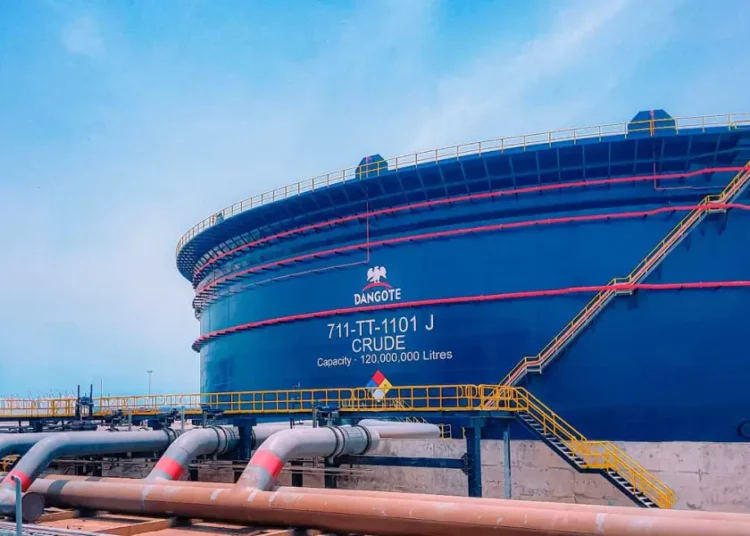Nigeria is standing on the verge of another fuel crisis—and it’s not because of global oil shocks or pipeline vandalism this time. It’s because a powerful union has decided to pull the plug on the country’s most ambitious industrial project: the Dangote Refinery.
Let’s be clear. Sacking 800 workers is no minor issue. Every worker matters, and their rights deserve to be protected. But does that justify shutting down crude supply, cutting gas flows, and threatening to plunge the entire country into darkness? No. That’s not negotiation. That’s blackmail, with 200 million Nigerians as collateral.
The Trade Union Congress may see this as a fight for Section 40 of the Constitution, which guarantees workers the right to associate freely. But there’s an equally vital constitutional duty here – the obligation to protect the economy and prevent mass suffering. If refineries stop producing, if thermal plants go dark, if petrol queues stretch for miles again, who pays the price? Not union executives. Ordinary Nigerians. The market woman in Oshodi. The barber in Aba. The small manufacturer in Kano who runs his machines on overpriced diesel.
Dangote Refinery isn’t perfect. No company is. But it is the one project in recent memory that gives Nigeria a chance to break free from decades of humiliating fuel importation. Every administration has promised self-sufficiency, and every promise has collapsed.
As of April 2025, the Nigerian Midstream and Downstream Petroleum Regulatory Authority (NMDPRA) reported that it had issued 83 licences to operate refineries; however, only five modular refineries are currently operational. Some have expressed genuine concern about a monopoly, but the most vociferous, including the unions, are among the most complicit in the decline of Nigeria’s four state-owned refineries.
The Dangote Refinery is not so much the outcome of a premeditated monopoly project as it is evidence of the audacity of one man’s effort despite the odds. It is regrettable that even before it has found its rhythm, it’s being dragged into a confrontation that could undo years of effort and billions of dollars of private investment.
Investors are watching. And what message do they see? That a union can, at will, cripple a $20 billion project, choke off national fuel supply, and threaten a total grid collapse. Why would foreign investors come under these conditions?
The Ministry of Labour is right to step in, but the government needs to take further action. This is not only about mediating between an employer and a union – it is about safeguarding a strategic national asset. Dangote Refinery is the backbone of Nigeria’s energy security. It deserves protection, not sabotage.
In the opinion of this newspaper, striking to make a point is one thing; deliberately shutting down fuel and power supply to millions is another. That crosses the line from protest into sabotage.
The broader implications cannot be overstated. Fuel shortages will choke commerce, drive up transportation costs, and exacerbate food inflation. Power cuts will shut factories and small businesses, resulting in job losses that extend far beyond the 800 workers already laid off. Even government finances will take a hit, because the refinery is one of the country’s largest taxpayers. Every day it remains idle is lost revenue the treasury can’t afford.
It is also worth remembering that the Dangote Refinery is the largest of its kind in Africa, a continental symbol of what is possible when African capital backs African ambition. Instead of being protected and celebrated, it is now being treated as a target. This is short-sighted and dangerous.
PENGASSAN and TUC must rethink their tactics. Courts and arbitration panels exist for a reason. Labour disputes belong at the negotiating table, not in the pipelines and power plants that millions depend on. To keep threatening the nation with blackout and fuel scarcity is to hold every Nigerian hostage in a fight that should have been settled through dialogue.
The federal government, meanwhile, cannot sit on the fence. It must act not as a neutral bystander but as the protector of national interest. That means ensuring workers are heard, but also ensuring the refinery continues to operate. Because once fuel queues return, once the grid begins to collapse, no one will remember the fine points of Section 40. Nigerians will only remember that their leaders stood by while their daily lives were disrupted.
This is a turning point. It will show whether Nigeria can balance workers’ rights with investor confidence, or whether we will once again descend into crisis because our institutions failed to act with wisdom. It is possible to achieve both justice and stability—but only if all sides pull back from the brink.
Dangote Refinery represents progress. PENGASSAN represents workers’ rights. These two forces do not have to be enemies. With mutual responsibility, they can coexist. However, if brinkmanship continues, the cost will be borne not by Dangote or union leaders but by the ordinary Nigerian who wants affordable fuel, steady electricity, and a chance to survive in an already challenging economy.
The choice before us is simple: defend progress, or watch it go up in smoke.





